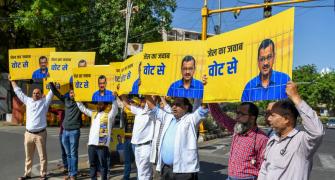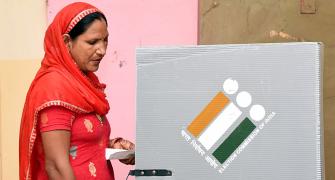Notwithstanding the completion of negotiations of the bilateral 123 agreement for the civilian nuclear co-operation between the United States and India, the nuclear deal between the two countries was never a fait accompli and its consummation was contingent upon completion of provisions contained in the Henry J Hyde United States-India Peaceful Atomic Energy Cooperation Act of 2006, say senior administration and Congressional officials.
The officials told rediff.com that thus far, only the Hyde Act, which is essentially the enabling legislation to facilitate the deal--approved overwhelmingly by the US House of Representatives and the Senate-- is cast in stone and cannot be changed, while it is not so for the 123 Agreement.
The Hyde Act, signed into law by President Bush in December last year, grants the President authority to waive certain sections of the Atomic Energy Act of 1954 and the 1978 Nuclear Nonproliferation Act --most importantly, that legally-designated non-nuclear weapons states, in this case India, must have full-scope safeguards on their nuclear materials--so as to allow for US-India civil nuclear cooperation.
Consequently, these officials said that with India shelving the next phase of the deal, that is, operationalising of the 123 Agreement, which for starters required negotiating a safeguards agreement with the International Atomic Energy Agency, the pending deal has essentially been rendered comatose but technically cannot be taken off life-support.
And it still could be resurrected if the IAEA safeguards agreement and a consensus of the Nuclear Suppliers Group endorsing the exemption granted to India by the Hyde Act are completed and the 123 Agreement returned to the US Congress for an up or down vote.
If this is not done, they explained, it would lie dormant, to be taken up another day, perhaps by another administration, but for it to proceed the requirements contained in the Hyde Act would still have to be met.
Hence, the reason, why the administration has remained circumspect when consistently asked by reporters if the 123 Agreement superseded the Hyde Act as the government of India has made known.
As some US lawmakers have already demanded, and introduced legislation, although non-binding, arguing that the 123 Agreement does not jel with some of the provisions of the Hyde Act, specifically with regard to the continuing supply of nuclear fuel to India even if India's tests another nuclear weapon, which by US law would automatically terminate such supplies, a new administration could call for the renegotiation of the 123 Agreement.
For the deal to come alive again, besides India operationalising the negotiated 123 Agreement and the NSG endorsing the India-specific exemption for nuclear fuel supplies and technology, this president, or any president that follows, must submit to Congress a determination that such actions have occurred, as well as summarizing India's separation plan, its safeguards agreement with the IAEA, and its progress toward conclusion and implementation of an additional protocol with the IAEA.
He or she would also have to describe the steps taken by India to work actively with the United States for the conclusion of a treaty to ban the production of fissile materials for use in nuclear weapons; that India is working with and supporting US and international efforts to prevent the spread of enrichment and reprocessing technologies; that India is taking the necessary steps to secure nuclear and other sensitive materials and technology, including through comprehensive export controls, harmonisation of these controls with the guidelines of the Missile Technology Control Regime and the NSG, and adherence to the MTCR and the NSG in accordance with the procedures of these regimes for unilateral adherence.
Besides all of these, the president would also have to convince Congress of the steps taken by India to harmonise its export control procedures with the Australia Group and the Waasenaar Arrangement guideless, and to participate in the Proliferation Security Initiative.
Also, specific measures India has taken to 'fully and actively participate' in the US and international efforts to prevent Iran from obtaining weapons of mass destruction; the scope of envisioned cooperation with India, including whether such cooperation will include provision of enrichment and reprocessing technology; and steps taken to ensure the proposed cooperation will not in any way assist India's nuclear weapons programme.
After all these are granted by the Congress after review and following a successful up or down vote--that is a Joint Resolution of Approval--that the deal would enter into force and civilian nuclear commerce can commence.
Alan Kronstadt, Specialist in South Asian Affairs at the Congressional Research Service, explained to rediff.com, that the 'deal' has never been ratified.
He pointed at the several required steps listed above that have to be taken before consummation of the deal.
But, he acknowledged that "the Hyde Act changed the law to allow any US president to waive standing obstacles to civil nuclear cooperation with India and India only".
Kronstadt said, "The 123 Agreement can certainly be renegotiated if the executive of either country seeks such or it can stand as is indefinitely. The ball is now clearly in India's court. If India successfully negotiates a safeguards agreement with the IAEA and the NSG agrees to nuclear trade with India, the US president can then send the 123 Agreement to Congress."
"If Congress approved with a joint resolution, cooperation can commence," he said, and added, "These developments can happen in the next few months or they could happen in 2009 or beyond."
Kronstadt said, "So, I think what we have here is indeed hibernation--everything is frozen in place and can be restarted at any time."







